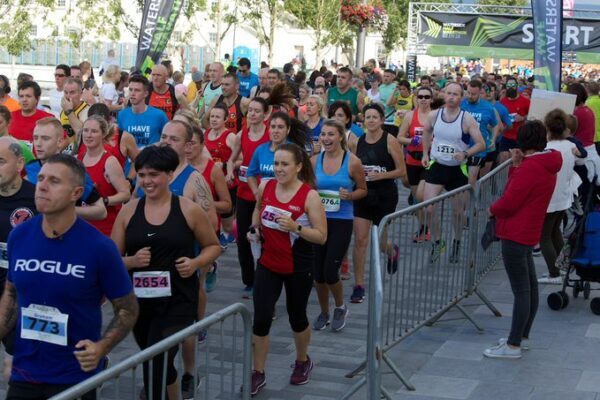 When around 200 runners gathered outside the entrance of St Columb’s Park on Sunday September 27th 1981 for a straight run out to Campsie and back, the small race organising committee could surely have never dreamt what the low key event would evolve into.
When around 200 runners gathered outside the entrance of St Columb’s Park on Sunday September 27th 1981 for a straight run out to Campsie and back, the small race organising committee could surely have never dreamt what the low key event would evolve into.
From those humble beginnings, the Waterside Half Marathon is still going strong 40 years later, attracting ten times that number each year.
Runners travel from all over Ireland and beyond to run the scenic course that takes in many of the city’s famous landmarks and both sides of the River Foyle.
The 40th edition of the WHM takes place on Sunday September 3rd and, to mark the landmark event, Mayor of Derry and Strabane, Councillor Sandra Duffy, recently reunited the original founders of the 1981 race including Helen Smyth, Carmel McCallion, Charlie Large, Mickey McDermott, Terry Watt and Gerry Craig for an anniversary lunch in the Guildhall.
Gerry Lynch and Denis McGowan were also part of that original committee and admit that hosting the first Waterside Half Marathon was a ‘shot in the dark’.
“It was the beginning of a running boom that swept through the city all through the 80s,” recalled Gerry. “It was a shot in the dark to put it on, we weren’t sure what kind of numbers we would get so we were delighted with the number of people who turned up.”
John McLaughlin from Annadale Striders was the first runner home that day in a time of 65 minutes and 35 seconds while Donegal’s Bernie Alcorn had the distinction of being the event’s first female winner in 97 minutes and 10 seconds.
Over the proceeding 40 years the times haven’t improved significantly with Ursula Noctor chipping away at the ladies record in her three successive wins in 1989, 1990 and 1991 when she ran 73 minutes and 16 seconds – a record which still stands to this day.
Derry’s own Paul Craig ran 64 minutes and 43 seconds in 1984, which remains the best time by a local, however Ethiopian Fedaku Digefu knocked 70 seconds off that to set a new men’s record in 1992.
“Over the 40 years the times for both the men’s and women’s races have been excellent,” Gerry added.
“In 1981 wee John McLaughlin ran 65 minutes on a day that wasn’t really the best of conditions for road running.
“For about 10 to 15 years the winning times for men were all in the 60s with the highlight being the Ethiopian who ran under 64 minutes and broke Paul Craig’s record.”
The mental health benefits of exercise and the expansion of the city’s greenway network has led to a resurgence in running locally in recent years and record registrations for the event.
The original race was organised off the back of a similar running boom, even if the factors at play were different, as Denis recalls:
“I remember things being a little chaotic (before the first event) but we knew we could organise a race and we did it and it’s fantastic that it’s still going 40 years later.
“In the early 80s I think people were looking for some sort of release from the Troubles, outdoor running allowed people to get out of the house and into the peaceful countryside to train.
“The first event was a real runners’ course, straight out and straight back, then we changed it and although the distance was the same it became a lot tougher so we haven’t seen a dramatic improvement in times.
“We could never have dreamt how big it has become and how long it has been running for.”
The course has evolved significantly from the straight run out to Campsie in 1981.
In recent years runners have had the challenge of the Foyle Bridge to contend with, the reward for which is a smooth descent down into Bay Park and past the city centre where runners get a glimpse of the Guildhall and the walls before finishing by crossing the Peace Bridge and onto the running track at St Columb’s Park.
“Our slogan in the early years was that it was a race ‘by runners for runners’ and we always tried to offer a runnable course,” Gerry continued.
“After 2006 we moved the race to start and finish in the Gransha grounds, finishing on the grass and in more recent years we have been able to incorporate the Peace Bridge and take in both sides of the cityside.
“It would be great to see some people who have run the event over the years coning back for the 40th edition, I’m still running these days but 13.1 miles is about 8 miles longer than I want to run.”
“It’s about 13 miles longer than I’d want to run…!” Denis interjected.
The 2023 edition of the Waterside Half Marathon on Sunday September 3rd at 9.30 am and will feature a running, wheelchair and three person relay section.
Registration costs £25 plus a booking fee while three person team relay costs £65.
Every finisher will receive a 40th anniversary commemorative medal and t shirt.
Registrations are open now at: derrystrabane.com/whm
Tags:




